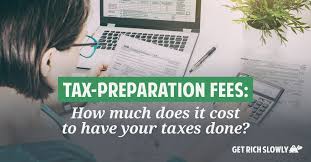Are you interested in know how much does tax preparation cost? Tax preparation cost is a crucial annual task that every individual and business owner must undertake. However, the cost associated with tax preparation can vary significantly depending on various factors, including complexity, location, and the method chosen.
In this article, we will delve into the various aspects of tax preparation costs, providing insights to help you make informed decisions and effectively manage your financial resources.
Understanding the Factors Influencing Tax Preparation Costs
Complexity of Tax Returns: The complexity of your tax situation plays a significant role in determining the cost of tax preparation. Individuals with straightforward tax situations, such as those who only earn income from a single job, might opt for basic tax software or inexpensive preparers.
On the other hand, businesses, freelancers, or those with multiple sources of income might require more comprehensive tax services, which can come at a higher cost.
Type of Tax Professional: The choice between hiring a certified public accountant (CPA), enrolled agent, tax attorney, or a tax preparation company can impact the cost. CPAs and tax attorneys typically charge higher fees due to their expertise, while enrolled agents and tax preparation companies might offer more affordable rates.
Geographical Location: Tax preparation costs can vary widely based on your geographical location. In metropolitan areas with a higher cost of living, tax professionals might charge more for their services compared to rural areas.
Method of Preparation: DIY tax preparation software, online platforms, and in-person services each come with different price tags. While software can be relatively inexpensive, it might not be suitable for complex situations. Online platforms offer varying levels of assistance, and in-person services usually cost more but can provide personalized advice.
Additional Services: Some tax professionals offer value-added services like financial planning, audit assistance, or bookkeeping. These services can add to the overall cost but might also provide significant benefits for certain individuals or businesses.
Timing: Rushing to get your taxes prepared close to the deadline might lead to higher costs, as tax professionals often charge more for last-minute services. Planning ahead and scheduling your tax preparation early can help you save money.
Documentation and Organization: Being well-prepared and organized can help reduce the time tax professionals spend on your returns, potentially leading to lower costs. Ensure you have all necessary documents and receipts ready before the tax preparation process begins.
Managing Tax Preparation Costs
Research: Research various tax professionals, firms, or software options in your area. Compare their services and fees to find the best fit for your needs and budget.
Evaluate Your Situation: Assess the complexity of your tax situation. If you have a straightforward return, consider using tax software or online platforms. For more intricate situations, hiring a tax professional might be more cost-effective in the long run.
Ask About Fees: When consulting with tax professionals, inquire about their fees and any potential additional charges. Make sure you have a clear understanding of what is included in the fee.
Negotiate: Some tax professionals might be open to negotiating their fees, especially during off-peak seasons. Don’t hesitate to discuss the possibility of reduced costs based on your circumstances.
Plan Ahead: Avoid the rush by starting the tax preparation process early. This can help you avoid last-minute fees and potentially give you more time to explore different options.
While the cost of tax preparation varies widely, the key to managing this expense lies in understanding your needs, researching your options, and planning ahead.
Consider your tax situation’s complexity, the level of assistance you require, and the available methods for tax preparation. By making informed decisions, you can effectively navigate the costs of tax preparation and ensure compliance with tax regulations while optimizing your financial resources.
Read Also: How to Find Investors for Wholesale Houses
Tax Preparation Cost Breakdown

Navigating the landscape of tax preparation costs requires a clear understanding of the various factors that contribute to the final bill. Choosing the right tax professional, planning ahead, and maintaining organized financial records can help mitigate costs while ensuring accurate and compliant tax filings.
As you prepare for the upcoming tax season, consider these cost breakdown factors to make informed decisions about your tax preparation strategy.
Professional Expertise: The backbone of tax preparation costs lies in the expertise of the tax professional you choose to hire. The level of experience, certifications, and specialization of the tax preparer can significantly influence the cost.
Enrolled Agents (EAs), Certified Public Accountants (CPAs), and tax attorneys tend to charge more due to their extensive knowledge and credentials. However, their expertise can also save you money by maximizing deductions and credits.
Complexity of Tax Situation: The complexity of your tax situation plays a pivotal role in determining the cost of tax preparation. Simple tax returns with only a few sources of income, standard deductions, and no additional complexities will generally have lower associated costs.
On the other hand, intricate situations involving multiple income sources, investments, business ownership, rental properties, and international income can lead to higher fees.
Types of Forms and Schedules: The variety and number of forms and schedules required for your tax return contribute to the cost. Common forms include the 1040, Schedule A (itemized deductions), Schedule C (sole proprietorship income), and Schedule E (rental income).
The more forms and schedules needed, the more time and effort the tax professional must invest, thereby affecting the cost.
Time and Effort Invested: The time and effort invested by the tax professional are directly proportional to the cost. This includes the time spent reviewing your financial documents, researching tax codes, and accurately completing the necessary forms.
More complex tax situations or incomplete documentation may require additional time and consequently incur higher fees.
Additional Services: Tax professionals may offer a range of additional services beyond basic tax preparation. These could include tax planning, audit representation, and financial advising. While these services can provide valuable insights and peace of mind, they often come with added costs.
Location and Firm Size: Geographical location and the size of the tax preparation firm can also influence costs. Tax professionals in urban areas or regions with a high cost of living tend to charge more due to increased overheads. Likewise, larger firms with more staff and resources may command higher fees compared to smaller, independent practitioners.
Filing Deadline and Rush Fees: Waiting until the last minute to have your taxes prepared can result in rush fees. Tax professionals might charge extra for expedited services to meet filing deadlines, particularly during peak tax season.
Tax season often brings with it a mix of anticipation and anxiety as individuals and businesses gather their financial records to meet their tax obligations. One of the crucial aspects to consider during this time is the cost of tax preparation. Understanding the breakdown of these costs can help individuals make informed decisions and better plan for their financial responsibilities.
Tax Preparation Cost Analysis
Tax preparation costs are a reality for everyone, but they don’t have to be a burden. Understanding the factors that influence these costs and adopting strategies to optimize your tax-related expenses can help ease the financial impact of tax season.
Whether you choose the DIY route, engage a tax professional, or rely on software, informed decisions can result in a smoother, more cost-effective tax preparation process.
Understanding Tax Preparation Costs
Tax preparation costs can vary significantly based on several factors:
Complexity of Finances: The complexity of your financial situation heavily influences the cost of tax preparation. Simple returns with a few sources of income, limited deductions, and no investments may incur lower costs.
However, self-employed individuals, freelancers, and those with multiple income streams, investments, or rental properties might find themselves paying more due to the intricacies of their financial situations.
Type of Service Provider: The choice between doing your taxes yourself, hiring a tax professional, or using tax software impacts the cost. DIY options are often the least expensive, but they might not be suitable for everyone. Tax professionals, like CPAs or tax advisors, offer personalized expertise, but their services come at a higher cost.
Geographic Location: Tax preparation costs can also vary based on your geographical location. Urban areas and regions with a higher cost of living often have higher fees for services.
Type of Tax Return: Different types of tax returns, such as personal, business, or estate tax returns, come with varying complexities and subsequently varying costs.
Strategies for Cost Optimization
Early Preparation: Procrastination can lead to hasty decisions and overlooked deductions. Starting the tax preparation process early allows you to gather all necessary documents, research deductions, and explore potential credits, potentially reducing costly errors.
Organized Record-Keeping: Maintaining organized financial records throughout the year can significantly simplify the tax preparation process. Accurate records enable you to provide your tax professional or tax software with all necessary information, reducing the time required and potential hourly charges.
Consider DIY Options: For individuals with relatively straightforward financial situations, using reputable tax software can be a cost-effective solution. It guides you through the process, helps you identify deductions, and usually costs less than hiring a professional.
Evaluate Tax Professionals: If you decide to hire a tax professional, do your research. Compare fees, read reviews, and inquire about the services included in the quoted cost. A higher fee doesn’t necessarily guarantee better service, so make sure the services offered align with your needs.
Maximize Deductions and Credits: Being well-informed about available deductions and tax credits is crucial. They can significantly reduce your tax liability and potentially outweigh the cost of tax preparation.
Tax season is a period that invokes mixed feelings for individuals and businesses alike. On one hand, there’s the anticipation of potential refunds, while on the other, there’s the daunting task of tax preparation.
As the yearly ritual of gathering financial information and navigating the intricate world of tax codes approaches, understanding the costs associated with tax preparation becomes essential.
Read Also: How to Find Investors to Start a Small Business
Tax Preparation Cost Factors

Tax preparation costs factors are a confluence of various factors that reflect the uniqueness of each individual’s or business’s financial circumstances. By understanding and evaluating these factors, taxpayers can make informed decisions about the level of professional assistance they require and the budget they need to allocate for tax preparation.
While the costs may vary, the benefits of accurate and expertly prepared tax returns can lead to financial stability and compliance with tax regulations.
Complexity of Financial Situation: The complexity of your financial situation stands as a paramount determinant of tax preparation costs. Simple tax returns with minimal sources of income and basic deductions generally incur lower costs.
However, as financial situations become more intricate, involving multiple income sources, investments, rental properties, or international transactions, the workload for tax professionals increases, leading to higher costs.
Type of Tax Professional: The choice of tax professional greatly influences the overall cost of tax preparation. Opting for a certified public accountant (CPA) or a tax attorney typically comes with higher fees due to their advanced qualifications and expertise.
Enrolled agents and tax preparers may offer more budget-friendly options, but the level of service and advice can vary accordingly.
Documentation and Recordkeeping: The accuracy of your tax return depends on the quality and completeness of your documentation. Organized and well-maintained financial records enable tax professionals to efficiently complete your return, potentially reducing the time and cost involved.
On the other hand, inadequate recordkeeping can lead to more time spent sorting through information and subsequently higher preparation costs.
Volume and Diversity of Deductions: The number and diversity of deductions you’re eligible for can significantly impact tax preparation costs. If you have a wide array of deductions, such as business expenses, charitable contributions, and medical expenses, the complexity of itemizing these deductions can escalate the overall cost.
Business Structure and Entity Type: For businesses, the type of entity structure (sole proprietorship, partnership, corporation, etc.) plays a pivotal role in determining tax preparation costs. Each structure has unique tax reporting requirements, which can influence the complexity of the return and, consequently, the cost of preparation.
State and Local Tax Considerations: Tax regulations vary from state to state, and some localities have additional tax requirements. Individuals and businesses operating across multiple jurisdictions or in states with complex tax laws may experience higher tax preparation costs due to the need for compliance with various regulations.
Timing and Urgency: The timing of when you engage a tax professional can also influence the cost. Waiting until the last minute, especially during the peak of tax season, might incur rush fees or higher charges due to the increased demand for services.
Additional Services: Beyond preparing tax returns, tax professionals may offer additional services such as tax planning, audit assistance, or financial consulting. These supplementary services can contribute to the overall cost but may also provide added value in terms of financial guidance and peace of mind.
Tax season often brings a mix of emotions for individuals and businesses alike. As the calendar pages turn towards April, the meticulous process of tax preparation takes center stage. While the process can be daunting, understanding the factors that influence tax preparation costs can help individuals and businesses navigate this intricate landscape with confidence.
Read Also: Benefits of Fun Toys to Toddlers
